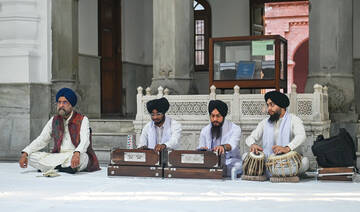Pakistan and Saudi Arabia have strong brotherly relations, deeply ingrained in the hearts of the people of the two countries.
The presence of more than 2.7 million Pakistanis in Saudi Arabia is a reflection of the strong bonds between the two nations. These expatriates have contributed to Saudi Arabia’s development, growth and prosperity.
The invaluable work done by Pakistani engineers, doctors, financial experts, architects, educationists and ordinary laborers is not only acknowledged but has also helped further cement the subterranean bonds of love and affinity between our two countries.
According to the available data, some 2 million Pakistani workers came to Saudi Arabia between 1971 and 2005.
With the arrival of the Pakistanis, the huge task of the development of the Kingdom began.
Roads and motorways, bridges, the two Holy Mosques, the holy precincts, deluxe hotels, immaculate highways, winding flyovers and underpasses, multi-storied residential complexes, the landmark Kingdom/Al-Faisaliah tower, royal guest houses and communications networks took shape out of brick and mortar. Pakistanis were engaged from designing to execution, everywhere.
In 1978, Pakistani engineers and technicians working with Bell Canada, Ericsson and Phillips were involved with the installation, operation and maintenance of switching, transmission and communication networks.
In addition, the present structure of the Saudi Electric Company is the brainchild of a handful of Water and Power Development Authority (WAPDA)-trained Pakistani engineers who completed the tasks of planning, designing, installation, operation and maintenance of the company.
Our specialists and consultants also helped to shape the banking and finance sectors of the Kingdom.
The National Bank of Pakistan (NBP) was one of the few international banks which, in 1949, received a license to operate in Saudi Arabia.
The Saudi Arabian Monetary Agency (SAMA) was established in 1952, and in 1964 King Faisal appointed a dynamic Pakistani economist, Dr. Anwar Ali, as the first governor of SAMA (1964-74). He formulated the agency’s banking control laws in 1966, introducing an annual report system and established an investment department to divert dollars — pouring in due to the oil price boom in 1973 — toward infrastructure development of the country. These initiatives still work as the bible of monetary policy of the country.
SAMA advisers Saeed Hamid, Hassan Mustafa, Misbah Uddin Farooqi and Pervaiz Hassan toiled from the early 60s till the early 90s to develop banking systems and procedures. Dr. Mohammed Umar Chabra (1966-1998) was another economist and researcher from Pakistan who propounded his theory on Islamic banking and won the prestigious King Faisal Award. He pioneered establishing the Islamic Development Bank in Jeddah.
Tariq Jawaid, another well-known economist and Pakistani finance wizard, started his services at SAMA in the early 80s and continues to do so.
He brought in more skilled bankers of Pakistani origin such as Jamil Ahmed, Rana Shahid Habib, Qaisar Noor, Mehdi Hassan and Abbas Hassan, who rendered their services for more than two decades. They made up the second generation of Pakistanis supplementing the commendable work done by their predecessors.
In the late 80s, almost 75 percent of CFOs were of Pakistani origin, and NBP held 40 percent of the shares in Bank Al-Jazeera. World-renowned Pakistani monetary expert Shaukat Aziz worked as a bank CEO from 1986 to 1988 and made a great contribution to the development of the banking sector in the Kingdom. The legacy continues with bankers such as Ghayas Beg, Shujaat Nadeem and Sajjad Rizvi.
Health care is yet another sector where Pakistani medical professionals have earned great prestige for their country.
In 1970, Dr. Naeem Ghani, a UK-trained general surgeon, joined the Military Hospital in Riyadh and established its surgical department, and his commendable work led to him being appointed as personal physician to the current King Salman. The late Princess Sultana Foundation was also established in Rawalpindi at his behest.
Dr. Shahid Nawaz helped to establish the Department of Cardiology in Buraida, and became a renowned cardiologist in the Kingdom. In the early 70s, Dr. Ashraf Ali and Dr. Halim Khan helped to set up the histopathology department in Riyadh.
Dr. Fazal-ur-Rehman, another prominent Pakistani cardiologist, headed the late King Khalid’s medical team and for his services in the health sector he was given a ministerial position.
Over 40 years ago, Dr. Ameer Bux Channa established the department of anesthesiology at the King Khalid University Hospital of King Saud University. His training programs are still followed at the university.
The second generation of health professionals came in the early 80s. Prof. Riaz Qureshi initiated the first Saudi Board Family Medicine Program. Senior Consultant Endocrinologist Dr. Sohail Inaam has been at the Prince Sultan Military Medical City for several decades. His contributions to research in diabetes are well recognized.
In the Eastern Province, the inaugural Eye Hospital was staffed by Pakistani consultant ophthalmologists such as Dr. Wajahat Ali Pirzada, who has been in the post for more than a quarter of a century. Dr. M F Siddiqui is a renowned author.
The Saudi Ministry of Health has been hiring thousands of physicians, medical specialists and consultants from Pakistan to run its national health program.
In addition, Pakistanis have left deep imprints in the educational sector of Saudi Arabia.
At the College of Medicine of King Saud University, Prof. Dr. Sultan Ayoub Meo, an internationally renowned Pakistani scholar, has made an important contribution toward research in diabetes in the Kingdom, for which he has been awarded the King Abdul Aziz medal of excellence.
Another notable Pakistani, Prof. Dr. Mohammed Khurram Khan, has played a pivotal role at the college of Computer and Information Sciences of the university, and set up the Center of Excellence for research in cybersecurity. His endeavors have also earned him the King Abdul Aziz medal of excellence.
There are also dozens of Pakistanis who have worked tirelessly for the university and earned great respect. Dr. Mujahid Kamran was a professor in the physics department before he joined Punjab University as its vice-chancellor.
In the development of mass communication and media, Pakistanis did not lag behind. Professor Javed Iqbal, from the College of Languages and Translation at King Saud University, made the first announcement from Saudi English Channel 2 in June 1981.
He remained as the only Asian program presenter who interviewed dozens of Pakistani dignitaries during their visits to Riyadh and produced programs on Pakistani culture.
In the Urdu service sector of Saudi Radio, he has presented his weekly programs for the past 37 years. For his contribution, he has been awarded the King Fahd Shield.
The hundreds of thousands of Pakistanis who helped to build Saudi infrastructure consider this country their second homeland.
Every inch of Saudi Arabia today bears the aroma of Pakistani sweat, and our Saudi brothers gratefully acknowledge it.
Pakistani expats have contributed to Saudi Arabia’s development, growth and prosperity, says diplomat
Pakistani expats have contributed to Saudi Arabia’s development, growth and prosperity, says diplomat

GACA to host Future Aviation Forum to drive global air transport growth

- Annual event offers international platform for exchanging solutions that boost efficiency and sustainability in the sector
RIYADH:The Future Aviation Forum will return to Riyadh from April 20-22, bringing together more than 11,000 global aviation experts and leaders, including ministers, regulators, manufacturers, airlines and airport authorities.
The General Authority of Civil Aviation said on X: “Under the patronage of King Salman, GACA is organizing the fourth edition of the Future Aviation Forum under the theme: Unlocking Global Growth, Designing the Future Sky.”
Organized by GACA, the annual forum is expected to help tackle the key issues and opportunities within the aviation industry.
The forum, which will see participation from more than 130 countries, 300 international speakers and in excess of 11,000 aviation industry experts, will discuss global aviation sector issues, environmental sustainability development and the enablement of advanced air mobility.
It will also focus on advancing the objectives of the aviation program aimed at transforming the Kingdom into a leading logistics hub in the Middle East and providing an attractive investment environment.
Minister of Transport and Logistic Services and GACA Board Chairman Saleh Al-Jasser said that hosting the fourth annual forum under the patronage of King Salman reflected the leadership’s commitment to boosting the Kingdom’s position as a global logistics hub linking three continents — Asia, Africa and Europe — in line with the objectives of the National Transport and Logistics Strategy.
He said the forum represented an international platform for exchanging innovative solutions that enhanced efficiency and sustainability in the aviation sector.











